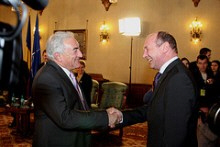
Typical street scene in Santa Ana, El Salvador. (Photo: iStock)
IMF Survey: More Integration and Cooperation Is Way Forward for Europe, IMF Chief Says
March 31, 2010
- Call for recommitment to integration and cooperation
- Reigniting growth, tackling unemployment key priorities
- Romania on road to economic recovery
The benefits of European integration are beyond doubt in terms of the democracy, prosperity, and increases in living standards that it has delivered for ordinary people, IMF Managing Director Dominique Strauss-Kahn told Romania’s parliament on March 30 on the final leg of his European trip.

President Traian Basescu (r) greets Strauss-Kahn during his visit to Romania, where a recovery is underway (photo: IMF)
THE ROAD AHEAD FOR EUROPE
But the aftermath of the crisis has also uncovered troubling weaknesses in Europe’s institutional framework. “We must use this crisis as an opportunity to move faster and deeper to strengthen integration,” he said.
During his stay in Bucharest, Strauss-Kahn also met with a group of business students at the Academy of Economic Studies. In response to questions, he told his audience how the IMF has changed to help countries cope with the crisis. IMF lending to countries during the crisis reached about $80 billion in funds committed to Europe alone. Working with governments, the IMF has also taken care to protect the most vulnerable groups in society, he said.
Strauss-Kahn praised his hosts for decisive action to combat the crisis. “Romania has taken bold decisions in the wake of the crisis, which came at a high cost to ordinary Romanians but I am convinced the outcome would have been much worse without it,” he said.
Three priorities for Europe
As Europe worked to reshape its institutions, Strauss-Kahn pointed to three priorities.
• First, a fundamental overhaul of Europe’s financial architecture is needed, in particular a system for crisis management and resolution of failed cross-border banks. Strauss-Kahn repeated his call, first made in a speech last week in Brussels, for an integrated European framework for crisis prevention, management and resolution. Current national efforts to overhaul financial regulation and supervision make sense, but need to fit together, he said.
• Second, Europe should strengthen its economic policy coordination, and place it in the broader context of the range of policies that matter for growth and economic stability. Currently, the major policy frameworks―economic, financial and structural―are relatively independent of one another. “The crisis has shown you can’t have a common currency without having a more coordinated economic policy,” he told parliament.
• Third, Strauss-Kahn stressed the need to reignite growth and tackle unemployment. In the short term, economic policies should support growth and facilitate adjustment. In the long term, improving Europe’s competitiveness will be key, including by tackling rigidities in labor and product markets, he said.
Recovery in emerging Europe
Countries in emerging Europe have weathered the global economic crisis very differently, ranging from Poland, which escaped recession altogether, to Ukraine, the Baltic countries, Hungary, and Romania, which all suffered severe downturns. Recovery is now underway in emerging Europe, with the IMF predicting growth of 2 percent in the region this year. But the crisis has taken its toll in the region, with deep output declines and rising unemployment.
Romania is a case in point. Economic growth dropped by more than 7 percent in 2009. While growth is expected to turn positive this year at 1.3 percent, unemployment remains high. But Strauss-Kahn encouraged the government to look beyond the crisis.
“I believe Romania must stay on the path of becoming more open, and more integrated with Europe and the rest of the world,” he said. “This is where future growth and jobs will come from.”
When the crisis hit, Romania’s government turned to the international community for assistance, and received a €12.9 billion loan from the IMF in March 2009, as part of a coordinated financial support package of €20 billion.
The IMF-supported program in Romania protects the lowest paid public employees and the poorest pensioners from the spending freezes. It also boosts social spending, including unemployment benefits and social safety nets, in order to protect the most vulnerable in times of crisis.
Romania was also one of the first countries to participate in the European Bank Coordination Initiative. The Vienna Initiative, as it is also known, has sought to prevent foreign-owned banks from pulling out of emerging Europe and is widely credited for having helped avert a systemic crisis in emerging Europe.


